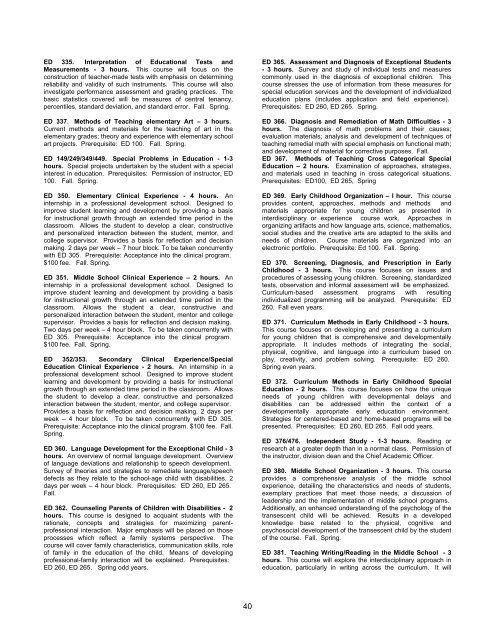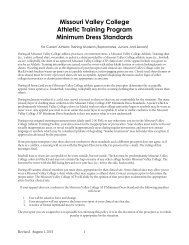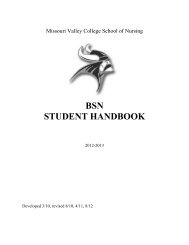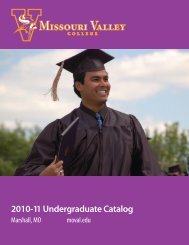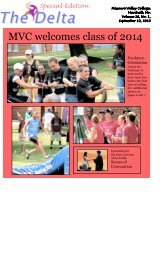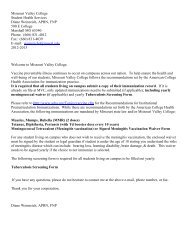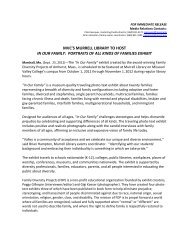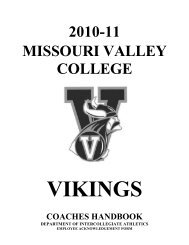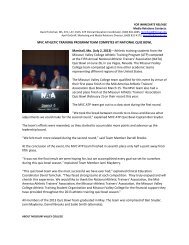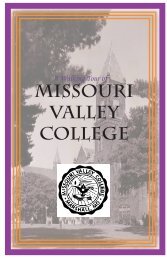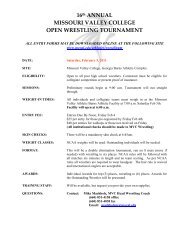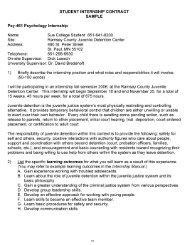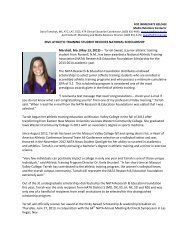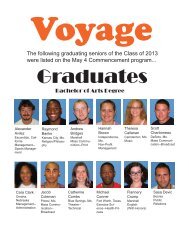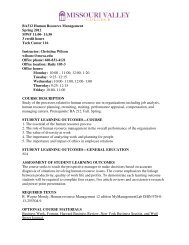2012-13 Undergraduate Catalog - Missouri Valley College
2012-13 Undergraduate Catalog - Missouri Valley College
2012-13 Undergraduate Catalog - Missouri Valley College
Create successful ePaper yourself
Turn your PDF publications into a flip-book with our unique Google optimized e-Paper software.
ED 335. Interpretation of Educational Tests and<br />
Measurements - 3 hours. This course will focus on the<br />
construction of teacher-made tests with emphasis on determining<br />
reliability and validity of such instruments. This course will also<br />
investigate performance assessment and grading practices. The<br />
basic statistics covered will be measures of central tenancy,<br />
percentiles, standard deviation, and standard error. Fall. Spring.<br />
ED 337. Methods of Teaching elementary Art – 3 hours.<br />
Current methods and materials for the teaching of art in the<br />
elementary grades; theory and experience with elementary school<br />
art projects. Prerequisite: ED 100. Fall. Spring.<br />
ED 149/249/349/449. Special Problems in Education - 1-3<br />
hours. Special projects undertaken by the student with a special<br />
interest in education. Prerequisites: Permission of instructor, ED<br />
100. Fall. Spring.<br />
ED 350. Elementary Clinical Experience - 4 hours. An<br />
internship in a professional development school. Designed to<br />
improve student learning and development by providing a basis<br />
for instructional growth through an extended time period in the<br />
classroom. Allows the student to develop a clear, constructive<br />
and personalized interaction between the student, mentor, and<br />
college supervisor. Provides a basis for reflection and decision<br />
making. 2 days per week – 7 hour block. To be taken concurrently<br />
with ED 305. Prerequisite: Acceptance into the clinical program.<br />
$100 fee. Fall. Spring.<br />
ED 351. Middle School Clinical Experience – 2 hours. An<br />
internship in a professional development school. Designed to<br />
improve student learning and development by providing a basis<br />
for instructional growth through an extended time period in the<br />
classroom. Allows the student a clear, constructive and<br />
personalized interaction between the student, mentor and college<br />
supervisor. Provides a basis for reflection and decision making.<br />
Two days per week – 4 hour block. To be taken concurrently with<br />
ED 305. Prerequisite: Acceptance into the clinical program.<br />
$100 fee. Fall. Spring.<br />
ED 352/353. Secondary Clinical Experience/Special<br />
Education Clinical Experience - 2 hours. An internship in a<br />
professional development school. Designed to improve student<br />
learning and development by providing a basis for instructional<br />
growth through an extended time period in the classroom. Allows<br />
the student to develop a clear, constructive and personalized<br />
interaction between the student, mentor, and college supervisor.<br />
Provides a basis for reflection and decision making. 2 days per<br />
week – 4 hour block. To be taken concurrently with ED 305.<br />
Prerequisite: Acceptance into the clinical program. $100 fee. Fall.<br />
Spring.<br />
ED 360. Language Development for the Exceptional Child - 3<br />
hours. An overview of normal language development. Overview<br />
of language deviations and relationship to speech development.<br />
Survey of theories and strategies to remediate language/speech<br />
defects as they relate to the school-age child with disabilities. 2<br />
days per week – 4 hour block. Prerequisites: ED 260, ED 265.<br />
Fall.<br />
ED 362. Counseling Parents of Children with Disabilities - 2<br />
hours. This course is designed to acquaint students with the<br />
rationale, concepts and strategies for maximizing parentprofessional<br />
interaction. Major emphasis will be placed on those<br />
processes which reflect a family systems perspective. The<br />
course will cover family characteristics, communication skills, role<br />
of family in the education of the child. Means of developing<br />
professional-family interaction will be explained. Prerequisites:<br />
ED 260, ED 265. Spring odd years.<br />
ED 365. Assessment and Diagnosis of Exceptional Students<br />
- 3 hours. Survey and study of individual tests and measures<br />
commonly used in the diagnosis of exceptional children. This<br />
course stresses the use of information from these measures for<br />
special education services and the development of individualized<br />
education plans (includes application and field experience).<br />
Prerequisites: ED 260, ED 265. Spring.<br />
ED 366. Diagnosis and Remediation of Math Difficulties - 3<br />
hours. The diagnosis of math problems and their causes;<br />
evaluation materials; analysis and development of techniques of<br />
teaching remedial math with special emphasis on functional math;<br />
and development of material for corrective purposes. Fall.<br />
ED 367. Methods of Teaching Cross Categorical Special<br />
Education – 2 hours. Examination of approaches, strategies,<br />
and materials used in teaching in cross categorical situations.<br />
Prerequisites: ED100, ED 265, Spring<br />
ED 369. Early Childhood Organization – l hour. This course<br />
provides content, approaches, methods and methods and<br />
materials appropriate for young children as presented in<br />
interdisciplinary or experience course work. Approaches in<br />
organizing artifacts and how language arts, science, mathematics,<br />
social studies and the creative arts are adapted to the skills and<br />
needs of children. Course materials are organized into an<br />
electronic portfolio. Prerequisite: Ed 100. Fall. Spring.<br />
ED 370. Screening, Diagnosis, and Prescription in Early<br />
Childhood - 3 hours. This course focuses on issues and<br />
procedures of assessing young children. Screening, standardized<br />
tests, observation and informal assessment will be emphasized.<br />
Curriculum-based assessment programs with resulting<br />
individualized programming will be analyzed. Prerequisite: ED<br />
260. Fall even years.<br />
ED 371. Curriculum Methods in Early Childhood - 3 hours.<br />
This course focuses on developing and presenting a curriculum<br />
for young children that is comprehensive and developmentally<br />
appropriate. It includes methods of integrating the social,<br />
physical, cognitive, and language into a curriculum based on<br />
play, creativity, and problem solving. Prerequisite: ED 260.<br />
Spring even years.<br />
ED 372. Curriculum Methods in Early Childhood Special<br />
Education - 2 hours. This course focuses on how the unique<br />
needs of young children with developmental delays and<br />
disabilities can be addressed within the context of a<br />
developmentally appropriate early education environment.<br />
Strategies for centered-based and home-based programs will be<br />
presented. Prerequisites: ED 260, ED 265. Fall odd years.<br />
ED 376/476. Independent Study - 1-3 hours. Reading or<br />
research at a greater depth than in a normal class. Permission of<br />
the instructor, division dean and the Chief Academic Officer.<br />
ED 380. Middle School Organization - 3 hours. This course<br />
provides a comprehensive analysis of the middle school<br />
experience, detailing the characteristics and needs of students,<br />
exemplary practices that meet those needs, a discussion of<br />
leadership and the implementation of middle school programs.<br />
Additionally, an enhanced understanding of the psychology of the<br />
transescent child will be achieved. Results in a developed<br />
knowledge base related to the physical, cognitive and<br />
psychosocial development of the transescent child by the student<br />
of the course. Fall. Spring.<br />
ED 381. Teaching Writing/Reading in the Middle School - 3<br />
hours. This course will explore the interdisciplinary approach in<br />
education, particularly in writing across the curriculum. It will<br />
40


